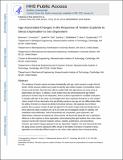Age-associated changes in the response of tendon explants to stress deprivation is sex-dependent
Author(s)
Connizzo, Brianne K; Piet, Judith M; Shefelbine, Sandra J; Grodzinsky, Alan J
DownloadAccepted version (2.633Mb)
Open Access Policy
Open Access Policy
Creative Commons Attribution-Noncommercial-Share Alike
Terms of use
Metadata
Show full item recordAbstract
© 2019, © 2019 Informa UK Limited, trading as Taylor & Francis Group. Purpose of the Study: The incidence of tendon injuries increases dramatically with age, which presents a major clinical burden. While previous studies have sought to identify age-related changes in extracellular matrix structure and function, few have been able to explain fully why aged tissues are more prone to degeneration and injury. In addition, recent studies have also demonstrated that age-related processes in humans may be sex-dependent, which could be responsible for muddled conclusions in changes with age. In this study, we investigate short-term responses through an ex vivo explant culture model of stress deprivation that specifically questions how age and sex differentially affect the ability of tendons to respond to altered mechanical stimulus. Materials and Methods: We subjected murine flexor explants from young (4 months of age) and aged (22–24 months of age) male and female mice to stress-deprived culture conditions for up to 1 week and investigated changes in viability, cell metabolism and proliferation, matrix biosynthesis and composition, gene expression, and inflammatory responses throughout the culture period. Results and Conclusions: We found that aging did have a significant influence on the response to stress deprivation, demonstrating that aged explants have a less robust response overall with reduced metabolic activity, viability, proliferation, and biosynthesis. However, age-related changes appeared to be sex-dependent. Together, this work demonstrates that the aging process and the subsequent effect of age on the ability of tendons to respond to stress-deprivation are inherently different based on sex, where male explants favor increased activity, apoptosis, and matrix remodeling while female explants favor reduced activity and tissue preservation.
Date issued
2020Department
Massachusetts Institute of Technology. Department of Biological Engineering; Massachusetts Institute of Technology. Center for Biomedical Engineering; Massachusetts Institute of Technology. Department of Electrical Engineering and Computer Science; Massachusetts Institute of Technology. Department of Mechanical EngineeringJournal
Connective Tissue Research
Publisher
Informa UK Limited